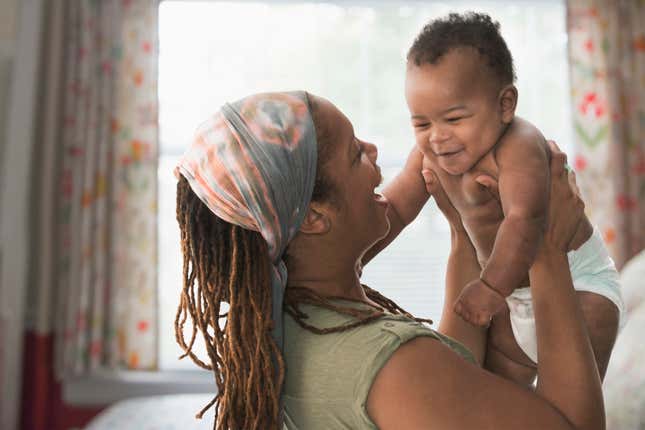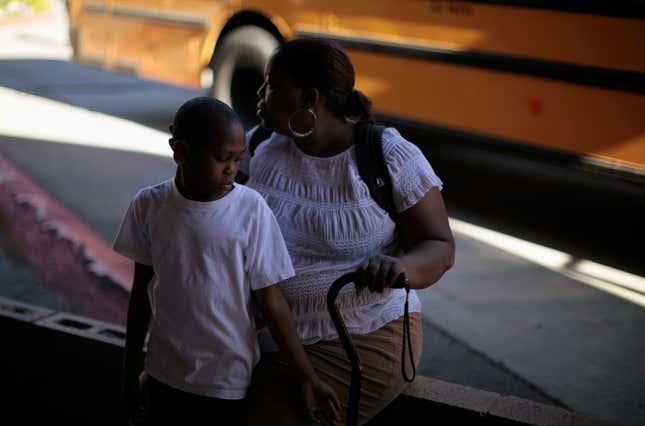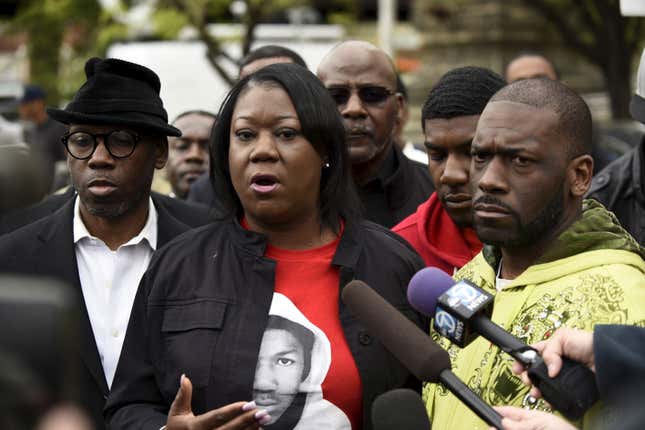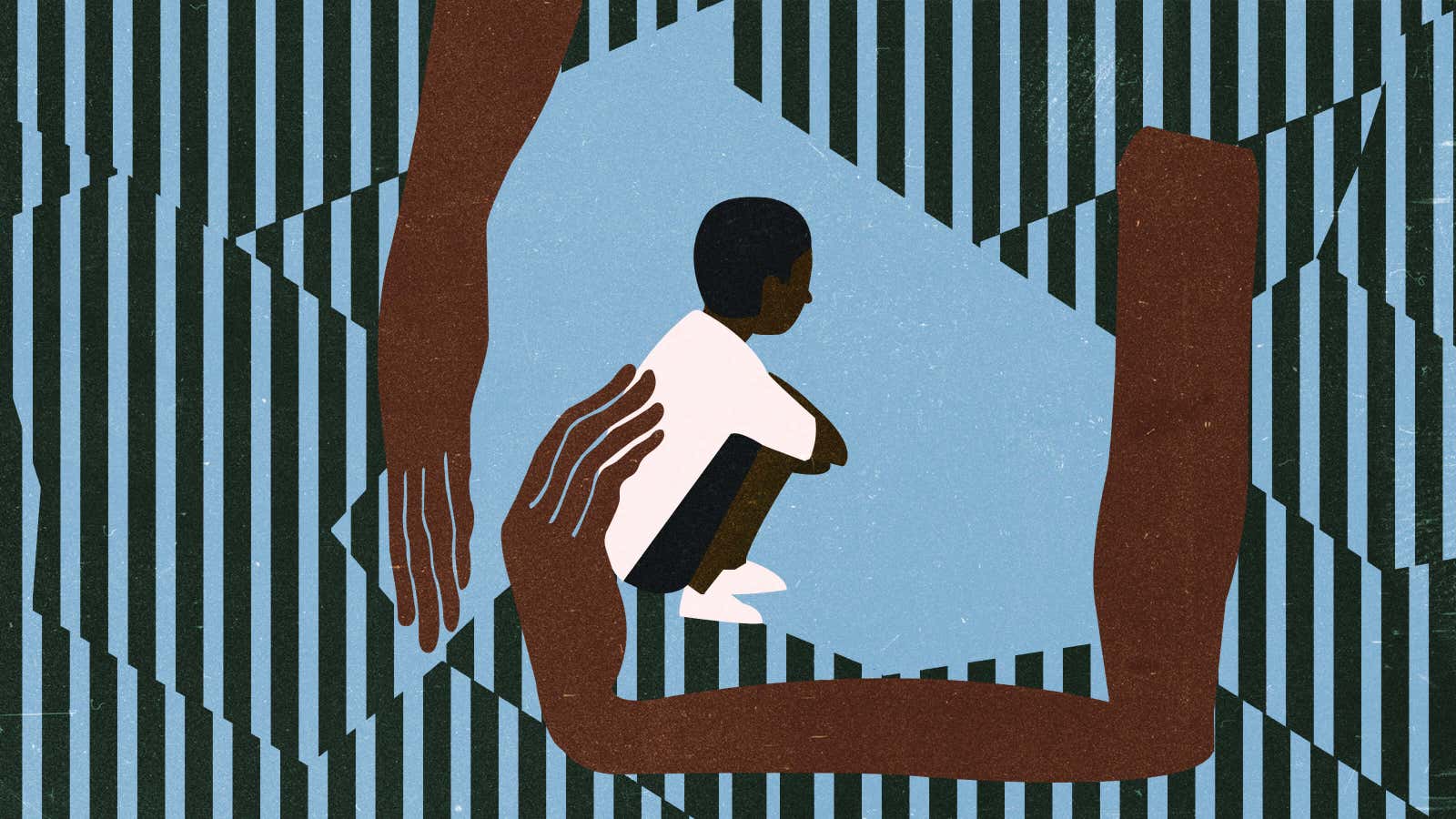Salena Alston is an involved parent. The 40-year-old mother of seven describes herself as a “liberally strict” mom who keeps track of her kids’ friends and whereabouts but also encourages their independence and accountability.
Alston wouldn’t call herself a helicopter parent per se, but it’s a trope that she sometimes identifies with, simply out of necessity. Raising black children in a predominantly white suburb of Atlanta sometimes requires an extra bit of “hovering.”
Recently, Alston and her husband saw their youngest, an 11-year-old boy, swinging on the net at their neighborhood’s tennis court with his friends, who were white. The couple decided it was time to have a talk with their son. “If someone was to walk up, you would get in more trouble than the rest of those kids,” Alston recalls telling him. “People aren’t as lenient with you as a black kid… They’re looking at you as the vandal.” Later that week, her son was sent to the principal’s office for having a weapon in his school bag—the blade of his broken pencil sharpener.
Earlier this year, Alston’s 13-year-old daughter got in trouble for having an orange in her hand when she boarded the bus, a violation of a rule against eating on the ride to school. The bus driver called in a school resource officer—a uniformed policeman—to reprimand her. Alston was livid, especially since the interaction with the officer would be noted in her child’s disciplinary file. “I talked to every supervisor that I could talk to,” she says, and she directly confronted the bus driver to help her understand the impact of her actions: “She’s a young black child, and this looks really bad on her record.”
Even when their children are in community spaces—at the local tennis court, at school—black parents often feel they can’t afford to take their eye off the ball. And while mainstream depictions of protective parents focus on wealthy, white mothers whisking kids from rehearsals to practices, many black parents practice a different type of protectiveness—an approach many feel is the only way to keep their kids safe in the face of systemic oppression. Alston feels this often. “I am their biggest voice. I have to advocate for them,” she says.
Not your average helicopter mom
The rise of intensive parenting in the US is usually traced back to the economic boom of the 1990s. In the years since, US parents have spent more time actively caring for their children than their parents did, and what sociologists call “intensive parenting” has become increasingly common. US mothers clock five more hours per week engaged in childcare activities than they did in 1965, and they continue to spend six more hours actively parenting than fathers.
Increasingly, researchers believe that rising inequality is behind the shift towards intensive parenting. Parents fill their kids’ lives with the best schools, activities, and internships possible—all in an attempt to promise them increasingly-elusive financial security as adults. Though data suggests a certain amount of intensive parenting can benefit children, parents can easily veer into controlling behaviors that stunt their kids instead of helping them grow.
Perhaps it is no surprise then that contemporary parenting anxieties are distilled in archetypes of over-involved, overprotective moms.
The “helicopter mom” is the most infamous of these tropes. The image of a mother hovering over her child’s every move speaks to a culture in which parents wait hours in line to tour the perfect high school for their teens, where they work tirelessly to prevent their toddlers from ever being bored. Another archetype, the lawnmower or bulldozer mom, takes this approach even further. The bulldozer mom doesn’t merely look out for any obstacles or discomfort headed her child’s way—she actively knocks down challenges and confronts would-be adversaries on her child’s behalf.

Some behaviors of stereotypical helicopter parents and intensive parents of black kids seem similar: confronting adults who seem to be treating your child unfairly, being watchful of your child’s social circle and intentional about their success, and carefully choosing schools. In fact, even though these parenting tropes are often the butt of jokes, the majority of parents across races in the US favor intensive parenting techniques.
But helicopter and bulldozer tropes are not only about what these parents do. It’s also about what motivates them to hover over their children. One criticism of white, wealthy helicopter and bulldozer mothers is that their tactics, which often require a great deal of money and time, actually perpetuate the inequalities that fuel their anxiety. Take the 2019 admissions scandal, the epitome of helicopter parenting behavior. The parents of the college admissions scandal paid for higher SAT scores, bribed admission gatekeepers, and encouraged their children to lie about their race on applications. They went to these great lengths with one goal: making sure their children landed in elite schools without having to do the work to get there.
This is where helicoptering and black mothering diverge. While helicopter moms are busy multiplying their children’s privilege and advantages, many black moms are fighting to protect their children from the structural disadvantages that keep opportunity just out of reach.
The burden of inequality
Even in an age of rising inequality, white children find socioeconomic mobility easier to come by than do black children. In Raj Chetty’s landmark study of 20 million Americans, one in 10 black kids who grew up poor made it to the top two quintiles of earners as adults. For white kids, that figure was one in four.
Inequality follows black children to school, a place traditionally seen as a vehicle for mobility. Black children are disciplined more often and more harshly than their white classmates. They are more likely to be arrested in school—in part because they are more likely to have police officers stationed at their schools. From preschool (pdf) onward, black children are suspended at almost four times the rate of their white peers, and research shows that teachers are more likely to expect black children, and especially black boys, to display “challenging behavior” even before they do anything wrong.
The threats extend beyond the classroom. Black teens go to jail for committing fewer crimes than their white counterparts. Black children are overrepresented in arrests for nebulous, low-level charges like loitering, breaking curfew, and suspicion. During the admissions scandal, many observers pointed out that black mothers had faced criminal charges for trying to get their kids into better schools, too—under very different circumstances. Tanya McDowell (sometimes written as Tonya) was charged with larceny for “stealing” $15,000 from Norwalk, Connecticut by sending her son to a public school there when they actually lived in homeless shelters in nearby, poorer Bridgeport. Kelley Williams-Bolar was sentenced to jail in Ohio for using her father’s address to send her kids to a better-funded public school.
These fundamentally different odds create separate motivations for black and white parents to be protective, even when they share class backgrounds. Riché Barnes, an anthropologist at Yale and the author of Raising the Race: Black Career Women Redefine Marriage, Motherhood, and Community, says the term “good school” holds different meanings for some black families. While white parents might be looking for schools that are mostly white and have high test scores, those same environments can actually hurt black students.
Research shows that non-black teachers routinely underestimate black children’s academic potential. Black kids who have had at least one black teacher by third grade are 7% more likely to graduate from high school and 13% more likely to enroll in college than their counterparts without black teachers.
In light of these statistics, Barnes says black parents are beginning to think, “Maybe my kids are better off in a school where the teachers love them and care about them and their heritage and want to teach them to love themselves and their heritage. And that ends up being just as important as if you do well on that test.”
For Winnie Caldwell, a 30-year-old mom raising her son in St. Louis, the challenge of finding the right school for her child came into focus in 2014, when her son was one of two black children in his third grade class. It was the year that Michael Brown, a black teenager, was killed by a white police officer in nearby Ferguson, Missouri. Caldwell says her son’s teacher, who was white, asked the class about the shooting and made it clear that she believed Brown was at fault. When Caldwell’s son came home that day, he asked, “Is that what’s going to happen to me when I’m 18? If I’m walking down the street, and the police find me, am I gonna die?”
Aisha Wadud, a 36-year-old mother of four from Minneapolis, says she is “very stern with other adults when it comes to [her] children and their care.” She’s a fierce advocate for them the way her mother was for her—Wadud remembers her mother taking on her younger sister’s school after a teacher called her a racial slur, the culmination of a trend of purposefully neglecting black students. “When my child comes to me and tells me something is wrong, I believe my children first,” Wadud says of her own approach to parenting. “And then I take action.”
The mothers who shared their stories with Quartz were clear that not all interactions with their children’s educators have been negative. “There are teachers and staff out here that advocate for our kids when we don’t have the time to do so. As a single mom, I know both sides,” Caldwell says. Alston, the Atlanta mother, is pleased with her children’s schools and appreciates that when she raises concerns, the teachers and administrators take them seriously.
Still, the toll of adversarial interactions with other authority figures in their children’s lives weighs on black parents. Just under half of parents of black children are very satisfied with their children’s schools, compared with 60% of parents overall and 65% of parents of white children. Dissatisfaction and concern over their children’s ability to feel confident and succeed in schools where they might be overlooked or mistreated leads some black parents to seek alternatives to traditional school settings—including schools with Afrocentric curricula or homeschooling.
Since the 2014 incident, Caldwell’s son, now 13, has moved to a majority-black, all-boys school. He also founded a nationwide book club for black boys. Though Caldwell says she did not choose her son’s new school based on its racial composition, she enjoys seeing him surrounded by other boys who look like him. “They have this sense of brotherhood, and I can tell that that’s infinitely helped his education.”

Parenting while black
Black parents who are forced to teach their children how to cope with inequality have to contend with another set of prejudices themselves, including being blamed for their children’s supposed misdeeds. A Google search of “African American parenting” or “Black parenting” returns results on authoritarianism, hostility, and toxic stress. Featured articles blame black parents for preschoolers’ bad behavior, adolescents’ obesity, and teens’ drug use. In the top results, there is nothing to be found about watchful protectiveness. (Much of this is about black mothers—black fathers are often excluded from conversations about parenting because academia and pop culture alike have perpetuated the stereotype that they do not parent, though research shows that black men actually spend more time with their children than men of other racial groups, regardless of whether they live full-time with their kids.)
“They’re seen as bad mothers,” says Barnes. “That’s a historical stereotype: That black women were bad mothers to their own children while at the same time being the women who raised white people [as enslaved caregivers and domestic servants].”
Black mothers’ vigilance and protectiveness long predates the intensive parenting boom in the 1990s. According to Barnes, whose work examines contemporary strategic mothering, black women have been watchful parents since slavery. “The community of enslaved women was charged on their own with ensuring the survival of those children, whether biological or not. And that’s a framework that has lasted throughout the African American experience,” she says.
Reporter Dani McClain agrees. In her account of Black motherhood, We Live for the We, she writes, “Black women have had to inhabit a different understanding of motherhood in order to navigate American life. If we merely accepted the status quo and failed to challenge the forces that have kept black people and women oppressed, then we participated in our own and our children’s destruction.” McClain’s words point to another reality of black motherhood—that raising healthy, happy black children is political. Under slavery and Jim Crow, when racial violence routinely stole black children away, keeping a black family together was an act of rebellion. McClain points out that even today, black mothers are charged with organizing movements while still mourning children lost to shootings by police and vigilantes.

Even so, mainstream narratives of motherhood exclude black women. When the author Neferti Austin began the process of adopting a child, she struggled to find books written by or for black mothers. The resources she found seemed to assume all moms were white and overlooked experiences common to black mothers and mothers-to-be: navigating higher-risk pregnancies, caring for children’s natural hair, explaining and combating systemic racism, or having “the talk” about interacting with police.
Austin decided to publish a book of her own, titled Motherhood So White: A Memoir of Race, Gender, and Parenting in America. Similarly frustrated with the lack of resources for new black mothers, Dani McClain wrote her book on black motherhood, too. Neither is a how-to guide, but both offer a comforting and all-too-rare message to black mothers: you are not alone.
This message is perhaps the oldest strategy black women have employed to sustain themselves and their families. Throughout history, black women have collectively raised communities of children, biologically related and not. These “othermothers,” as black feminist scholar Patricia Hill Collins terms them, provide crucial support to black children and to one another. Together, they face down inequality and seemingly unbeatable odds to ensure their families survive—and thrive. In Barnes’ words, black women have always known, “[Mothering] is not just about raising children… It’s not just about making sure people are alive. It’s also about making sure that their spirits are intact, that their souls are intact, that they are finding joy.”
Correction: This article previously named the author of a study referenced as Richard Chetty. The study was actually conducted by Raj Chetty.
